 Tìm kiếm
Tìm kiếm
Chương I Luật trẻ em 2016: Những quy định chung
| Số hiệu: | 102/2016/QH13 | Loại văn bản: | Luật |
| Nơi ban hành: | Quốc hội | Người ký: | Nguyễn Thị Kim Ngân |
| Ngày ban hành: | 05/04/2016 | Ngày hiệu lực: | 01/06/2017 |
| Ngày công báo: | 18/05/2016 | Số công báo: | Từ số 339 đến số 340 |
| Lĩnh vực: | Văn hóa - Xã hội | Tình trạng: | Còn hiệu lực |
TÓM TẮT VĂN BẢN
Văn bản tiếng việt
Văn bản tiếng anh
Trẻ em là người dưới 16 tuổi.
Luật này quy định về quyền, bổn phận của trẻ em; nguyên tắc, biện pháp bảo đảm thực hiện quyền trẻ em; trách nhiệm của cơ quan, tổ chức, cơ sở giáo dục, gia đình, cá nhân trong việc thực hiện quyền và bổn phận của trẻ em.
Cơ quan nhà nước, tổ chức chính trị, tổ chức chính trị - xã hội, tổ chức chính trị xã hội - nghề nghiệp, tổ chức xã hội, tổ chức xã hội - nghề nghiệp, tổ chức kinh tế, đơn vị sự nghiệp, đơn vị vũ trang nhân dân, cơ sở giáo dục, gia đình, công dân Việt Nam; cơ quan, tổ chức quốc tế, tổ chức nước ngoài hoạt động trên lãnh thổ Việt Nam, cá nhân là người nước ngoài cư trú tại Việt Nam (sau đây gọi chung là cơ quan, tổ chức, cơ sở giáo dục, gia đình, cá nhân).
Trong Luật này, các từ ngữ dưới đây được hiểu như sau:
1. Bảo vệ trẻ em là việc thực hiện các biện pháp phù hợp để bảo đảm trẻ em được sống an toàn, lành mạnh; phòng ngừa, ngăn chặn và xử lý các hành vi xâm hại trẻ em; trợ giúp trẻ em có hoàn cảnh đặc biệt.
2. Phát triển toàn diện của trẻ em là sự phát triển đồng thời cả về thể chất, trí tuệ, tinh thần, đạo đức và mối quan hệ xã hội của trẻ em.
3. Chăm sóc thay thế là việc tổ chức, gia đình, cá nhân nhận trẻ em về chăm sóc, nuôi dưỡng khi trẻ em không còn cha mẹ; trẻ em không được hoặc không thể sống cùng cha đẻ, mẹ đẻ; trẻ em bị ảnh hưởng bởi thiên tai, thảm họa, xung đột vũ trang nhằm bảo đảm sự an toàn và lợi ích tốt nhất của trẻ em.
4. Người chăm sóc trẻ em là người đảm nhận nhiệm vụ chăm sóc trẻ em, bao gồm người giám hộ của trẻ em; người nhận chăm sóc thay thế hoặc người được giao trách nhiệm cùng với cha, mẹ của trẻ em cấp dưỡng, chăm sóc, bảo vệ trẻ em.
5. Xâm hại trẻ em là hành vi gây tổn hại về thể chất, tình cảm, tâm lý, danh dự, nhân phẩm của trẻ em dưới các hình thức bạo lực, bóc lột, xâm hại tình dục, mua bán, bỏ rơi, bỏ mặc trẻ em và các hình thức gây tổn hại khác.
6. Bạo lực trẻ em là hành vi hành hạ, ngược đãi, đánh đập; xâm hại thân thể, sức khỏe; lăng mạ, xúc phạm danh dự, nhân phẩm; cô lập, xua đuổi và các hành vi cố ý khác gây tổn hại về thể chất, tinh thần của trẻ em.
7. Bóc lột trẻ em là hành vi bắt trẻ em lao động trái quy định của pháp luật về lao động; trình diễn hoặc sản xuất sản phẩm khiêu dâm; tổ chức, hỗ trợ hoạt động du lịch nhằm mục đích xâm hại tình dục trẻ em; cho, nhận hoặc cung cấp trẻ em để hoạt động mại dâm và các hành vi khác sử dụng trẻ em để trục lợi.
8. Xâm hại tình dục trẻ em là việc dùng vũ lực, đe dọa dùng vũ lực, ép buộc, lôi kéo, dụ dỗ trẻ em tham gia vào các hành vi liên quan đến tình dục, bao gồm hiếp dâm, cưỡng dâm, giao cấu, dâm ô với trẻ em và sử dụng trẻ em vào mục đích mại dâm, khiêu dâm dưới mọi hình thức.
9. Bỏ rơi, bỏ mặc trẻ em là hành vi của cha, mẹ, người chăm sóc trẻ em không thực hiện hoặc thực hiện không đầy đủ nghĩa vụ, trách nhiệm của mình trong việc chăm sóc, nuôi dưỡng trẻ em.
10. Trẻ em có hoàn cảnh đặc biệt là trẻ em không đủ Điều kiện thực hiện được quyền sống, quyền được bảo vệ, quyền được chăm sóc, nuôi dưỡng, quyền học tập, cần có sự hỗ trợ, can thiệp đặc biệt của Nhà nước, gia đình và xã hội để được an toàn, hòa nhập gia đình, cộng đồng.
11. Giám sát việc thực hiện quyền trẻ em theo ý kiến, nguyện vọng của trẻ em là việc xem xét, đánh giá hoạt động của các cơ quan, tổ chức, cá nhân liên quan về trách nhiệm bảo đảm thực hiện quyền trẻ em và giải quyết các ý kiến, kiến nghị của trẻ em, bảo đảm lợi ích tốt nhất của trẻ em.
1. Bảo đảm để trẻ em thực hiện được đầy đủ quyền và bổn phận của mình.
2. Không phân biệt đối xử với trẻ em.
3. Bảo đảm lợi ích tốt nhất của trẻ em trong các quyết định liên quan đến trẻ em.
4. Tôn trọng, lắng nghe, xem xét, phản hồi ý kiến, nguyện vọng của trẻ em.
5. Khi xây dựng chính sách, pháp luật tác động đến trẻ em, phải xem xét ý kiến của trẻ em và của các cơ quan, tổ chức có liên quan; bảo đảm lồng ghép các mục tiêu, chỉ tiêu về trẻ em trong quy hoạch, kế hoạch phát triển kinh tế - xã hội quốc gia, ngành và địa phương.
1. Tước đoạt quyền sống của trẻ em.
2. Bỏ rơi, bỏ mặc, mua bán, bắt cóc, đánh tráo, chiếm đoạt trẻ em.
3. Xâm hại tình dục, bạo lực, lạm dụng, bóc lột trẻ em.
4. Tổ chức, hỗ trợ, xúi giục, ép buộc trẻ em tảo hôn.
5. Sử dụng, rủ rê, xúi giục, kích động, lợi dụng, lôi kéo, dụ dỗ, ép buộc trẻ em thực hiện hành vi vi phạm pháp luật, xúc phạm danh dự, nhân phẩm người khác.
6. Cản trở trẻ em thực hiện quyền và bổn phận của mình.
7. Không cung cấp hoặc che giấu, ngăn cản việc cung cấp thông tin về trẻ em bị xâm hại hoặc trẻ em có nguy cơ bị bóc lột, bị bạo lực cho gia đình, cơ sở giáo dục, cơ quan, cá nhân có thẩm quyền.
8. Kỳ thị, phân biệt đối xử với trẻ em vì đặc Điểm cá nhân, hoàn cảnh gia đình, giới tính, dân tộc, quốc tịch, tín ngưỡng, tôn giáo của trẻ em.
9. Bán cho trẻ em hoặc cho trẻ em sử dụng rượu, bia, thuốc lá và chất gây nghiện, chất kích thích khác, thực phẩm không bảo đảm an toàn, có hại cho trẻ em.
10. Cung cấp dịch vụ Internet và các dịch vụ khác; sản xuất, sao chép, lưu hành, vận hành, phát tán, sở hữu, vận chuyển, tàng trữ, kinh doanh xuất bản phẩm, đồ chơi, trò chơi và những sản phẩm khác phục vụ đối tượng trẻ em nhưng có nội dung ảnh hưởng đến sự phát triển lành mạnh của trẻ em.
11. Công bố, tiết lộ thông tin về đời sống riêng tư, bí mật cá nhân của trẻ em mà không được sự đồng ý của trẻ em từ đủ 07 tuổi trở lên và của cha, mẹ, người giám hộ của trẻ em.
12. Lợi dụng việc nhận chăm sóc thay thế trẻ em để xâm hại trẻ em; lợi dụng chế độ, chính sách của Nhà nước và sự hỗ trợ, giúp đỡ của tổ chức, cá nhân dành cho trẻ em để trục lợi.
13. Đặt cơ sở dịch vụ, cơ sở sản xuất, kho chứa hàng hóa gây ô nhiễm môi trường, độc hại, có nguy cơ trực tiếp phát sinh cháy, nổ gần cơ sở cung cấp dịch vụ bảo vệ trẻ em, cơ sở giáo dục, y tế, văn hoá, Điểm vui chơi, giải trí của trẻ em hoặc đặt cơ sở cung cấp dịch vụ bảo vệ trẻ em, cơ sở giáo dục, y tế, văn hóa, Điểm vui chơi, giải trí của trẻ em gần cơ sở dịch vụ, cơ sở sản xuất, kho chứa hàng hóa gây ô nhiễm môi trường, độc hại, có nguy cơ trực tiếp phát sinh cháy, nổ.
14. Lấn chiếm, sử dụng cơ sở hạ tầng dành cho việc học tập, vui chơi, giải trí và hoạt động dịch vụ bảo vệ trẻ em sai mục đích hoặc trái quy định của pháp luật.
15. Từ chối, không thực hiện hoặc thực hiện không đầy đủ, không kịp thời việc hỗ trợ, can thiệp, điều trị trẻ em có nguy cơ hoặc đang trong tình trạng nguy hiểm, bị tổn hại thân thể, danh dự, nhân phẩm.
1. Nhà nước bảo đảm nguồn lực thực hiện mục tiêu, chỉ tiêu về trẻ em trong quy hoạch, kế hoạch phát triển kinh tế - xã hội quốc gia, ngành và địa phương; ưu tiên bố trí nguồn lực để bảo vệ trẻ em, bảo đảm thực hiện quyền trẻ em.
2. Nguồn tài chính thực hiện quyền trẻ em bao gồm ngân sách nhà nước; ủng hộ của cơ quan, tổ chức, gia đình, cá nhân trong nước, nước ngoài; nguồn thu từ hoạt động cung cấp dịch vụ; viện trợ quốc tế và các nguồn thu hợp pháp khác.
3. Nhà nước có giải pháp về nhân lực và bảo đảm Điều kiện cho việc thực hiện quyền trẻ em; phát triển mạng lưới người được giao làm công tác bảo vệ trẻ em các cấp, ưu tiên bố trí người làm công tác bảo vệ trẻ em cấp xã và vận động nguồn lực để phát triển mạng lưới cộng tác viên bảo vệ trẻ em tại thôn, làng, ấp, bản, buôn, phum, sóc, tổ dân phố, khu phố, khóm.
1. Trình cơ quan nhà nước có thẩm quyền ban hành hoặc ban hành theo thẩm quyền văn bản quy phạm pháp luật và chỉ đạo, tổ chức thực hiện văn bản quy phạm pháp luật về trẻ em.
2. Xây dựng và tổ chức thực hiện chiến lược, chính sách, mục tiêu quốc gia về trẻ em.
3. Hướng dẫn cơ quan, tổ chức, cơ sở giáo dục, gia đình, cá nhân về biện pháp, quy trình, tiêu chuẩn bảo đảm thực hiện quyền trẻ em theo quy định của pháp luật.
4. Tuyên truyền, giáo dục pháp luật về trẻ em; truyền thông, phổ biến kiến thức, kỹ năng và vận động xã hội thực hiện quyền trẻ em.
5. Xây dựng, đào tạo, bồi dưỡng đội ngũ cán bộ, công chức, viên chức, người được giao làm công tác bảo vệ trẻ em, người chăm sóc trẻ em và mạng lưới cộng tác viên bảo vệ trẻ em thực hiện quyền của trẻ em.
6. Thanh tra, kiểm tra việc thực hiện pháp luật về trẻ em; giải quyết khiếu nại, tố cáo và xử lý vi phạm pháp luật về trẻ em; giải quyết, đôn đốc việc giải quyết ý kiến, kiến nghị của trẻ em, người giám hộ và tổ chức đại diện tiếng nói, nguyện vọng của trẻ em.
7. Thực hiện công tác thống kê, thông tin, báo cáo về tình hình trẻ em và việc thực hiện pháp luật về trẻ em cho cơ quan nhà nước có thẩm quyền.
8. Hợp tác quốc tế về thực hiện quyền trẻ em.
1. Bộ, cơ quan ngang bộ, cơ quan thuộc Chính phủ phối hợp với cơ quan quản lý nhà nước về trẻ em và cơ quan, tổ chức liên quan thực hiện công tác thanh tra, kiểm tra, giải quyết kiến nghị, khiếu nại, tố cáo và xử lý vi phạm pháp luật về trẻ em.
2. Cơ quan, tổ chức, cơ sở giáo dục, gia đình, cá nhân có trách nhiệm bảo đảm thực hiện quyền và bổn phận của trẻ em; hỗ trợ, tạo Điều kiện để trẻ em thực hiện quyền và bổn phận của mình theo quy định của pháp luật; phối hợp, trao đổi thông tin trong quá trình thực hiện.
3. Tổ chức chính trị - xã hội, tổ chức xã hội có trách nhiệm phối hợp với cơ quan quản lý nhà nước về trẻ em trong quá trình thực hiện nhiệm vụ liên quan đến trẻ em.
1. Trẻ em có hoàn cảnh đặc biệt bao gồm các nhóm sau đây:
a) Trẻ em mồ côi cả cha và mẹ;
c) Trẻ em không nơi nương tựa;
h) Trẻ em phải bỏ học kiếm sống chưa hoàn thành phổ cập giáo dục trung học cơ sở;
i) Trẻ em bị tổn hại nghiêm trọng về thể chất và tinh thần do bị bạo lực;
l) Trẻ em bị xâm hại tình dục;
n) Trẻ em mắc bệnh hiểm nghèo hoặc bệnh phải điều trị dài ngày thuộc hộ nghèo hoặc hộ cận nghèo;
o) Trẻ em di cư, trẻ em lánh nạn, tị nạn chưa xác định được cha mẹ hoặc không có người chăm sóc.
2. Chính phủ quy định chi tiết các nhóm trẻ em có hoàn cảnh đặc biệt và chính sách hỗ trợ phù hợp đối với từng nhóm trẻ em có hoàn cảnh đặc biệt.
1. Tháng hành động vì trẻ em được tổ chức vào tháng 6 hằng năm để thúc đẩy phong trào toàn dân chăm sóc, giáo dục và bảo vệ trẻ em; tuyên truyền, phổ biến, vận động cơ quan, tổ chức, cơ sở giáo dục, gia đình, cá nhân thực hiện chính sách, chương trình, kế hoạch, dự án, xây dựng các công trình và vận động nguồn lực cho trẻ em.
2. Bộ Lao động - Thương binh và Xã hội chủ trì, phối hợp với các cơ quan, tổ chức liên quan để chỉ đạo, tổ chức và hướng dẫn thực hiện Tháng hành động vì trẻ em.
A child is a human being below the age of 16.
This Law provides for children’s rights and responsibilities; rules and methods of ensuring children’s rights; duties of agencies, organization, education facilities, families and individuals to exercise children’s rights and responsibilities.
State agencies, political organizations, socio-political organizations, political-social-professional organizations, social organizations, socio-professional organizations, economic organizations, non-business units, people's armed force units, educational establishments, families and Vietnamese citizens; international organizations and bodies, and foreign organizations that operate in the territory of Vietnam, and foreigners residing in Vietnam (hereinafter referred to as agencies, organizations, educational establishments, families and individuals).
Article 4. Interpretation of terms
In this Law, these terms are construed as follows:
1. Child protection refers to the implementation of appropriate measures for ensuring safe and healthy life for children, the prevention and response to child abuse and the support for disadvantaged children.
2. Children's comprehensive development refers to the development in all terms of physical, intellectual, mental and ethical aspects and social relations of children.
3. Surrogate care refers to the fact that an organization, family or individual undertakes to take care of an orphan, a child who is not permitted to or cannot live with natural parents or a child who is affected by natural disasters and calamities or aimed conflict for the purpose of ensuring the safety and best interests of such child.
4. Child caregiver is the one who undertakes to take care of a child. Such caregiver can be the child's guardian or the one who performs the surrogate care or is assigned to support, take care of or protect the child together with such child’s parent.
5. Child abuse refers to any act that results in harm to the body, emotion, psychology, honor or human dignity of such child through violence against the child, child exploitation, sexual abuse, neglect and abandonment, and other forms of causing harm to the child.
6. Violence against the child refers to acts of maltreating, persecuting or beating a child; taking physical abuse or causing harm to the child’s health; reviling or offending honor or dignity of the child; segregating, driving the child away and other deliberate acts that cause physical and mental harm to the child.
7. Child exploitation refers to the act of forcing the child to work against the law on labor, perform or produce pornographic products; organizing or supporting for tourist activities for the purpose of child sexual abuse; offering, adopting or supplying the child for prostitution and other acts of using the child for profiteering purpose.
8. Child sexual abuse refers to the act of using violence, threatening to use violence, forcing, persuading or seducing a child to engage in sexual acts. The child sexual abuse includes rape, aggravated rape, sexual intercourse or molestation with children and use of children for prostitution or pornography in any form.
9. Child neglect and abandonment refers to the child parent’s or the child caregiver’s failure to perform or inadequate performance of their duties to take care of the child.
10. Disadvantaged children refer to those who are unable to exercise their rights to life, protection, nurture and education, and need a special assistance and intervention of the Government, families and society so that they can live safely and fall in line with their families and the community.
11. Supervision of the exercise of the children's rights upon the children's proposal and expectation refers to the evaluation of activities carried out by relevant agencies, organizations and individuals for ensuring the children’s rights and response to children’s proposals for the purpose of protecting children’s best interests.
Article 5. Rules for ensuring the exercise of children’s rights and responsibilities
1. Facilitate children in exercising their rights and responsibilities in adequate manner.
2. Do not discriminate against children.
3. Ensuring children’s best interests while making decisions relating children.
4. Respect, listen, consider and respond to children’s proposals and expectations.
5. Consider ideas of children and those of relevant agencies and organizations while establishing policies and laws affecting children; combine goals or objectives regarding children in national, sector and local socio-economic development plans.
1. Deprive children of right to life.
2. Neglect, abandon or engage in children trafficking, kidnap, swap and appropriate children.
3. Involve in child sexual abuse, use violence against children, abuse or exploit children.
4. Organize, support, incite or force the child to engage in child marriage.
5. Use, persuade, incite, excite, entice or force children to commit violations against the law, or offend honor or dignity of other person.
6. Prevent children from exercising their rights and responsibilities.
7. Fails to provide or conceal or preclude the provision of information concerning children who are abused or threatened to be exploited or suffered violence to their families, educational establishments or competent agencies and officials.
8. Discriminate against children on the grounds of their personal characters, family background, sex, race, nationality, belief or religion.
9. Sell or facilitate children in drinking alcohol or beer, smoking and using addictive substances or other stimulants, and unsafe foods which may cause harm to children.
10. Provide internet service and other services; produce, reproduce, release, operate, disseminate, possess, transport, store and trade in publications, toys, games and other products whose contents cause adverse influence on children’s healthy development.
11. Announce or disclose information about the privacy or secret of the child without the consent of the child who is enough 07 years old or older, or the consent of the child’s parent or guardian.
12. Make corrupt use of the child surrogate care to harm such child; take advantage of state policies and aid granted by organizations or individuals to seek private profit.
13. Build service facilities, production establishments or warehouses storing goods that cause environmental pollution, toxic chemicals or inflammables near facilities providing children protection services, educational establishments, health establishments, cultural establishments, children’s entertainment and amusement centers or vice versa.
14. Encroach or use facilities that serve children’s study, entertainment and other children protection services for purposes other than those regulated or illegal purposes.
15. Refuse, fail to perform or perform in insufficient untimely manner the support, intervention or treatment for children who are threatened to be or in peril, and whose body, honor or dignity are harmed.
Article 7. Resources for ensuring the exercise of children’s rights and protecting children
1. The Government shall guarantee the resources for fulfilling goals and objectives concerning children in national, sector and local socio-economic development plans; prioritize the arrangement of resources for protecting children and ensuring the exercise of children’s rights.
2. Financial sources for exercising children's rights includes funding from state budget, aids granted by domestic and foreign agencies, organizations, families and individuals, earnings from provided services, international aids and other lawful sources of income.
3. The Government shall provide human resource solutions and facilitate the exercise of children’s rights; develop networks of individuals who are charged with protecting children's rights at all levels, prioritize the arrangement of individuals in charge of child protection affairs at communal level and mobilize resources for developing networks of freelancers in charge of protecting children at hamlets, villages, highland villages, mountainous villages, residential groups and quarters.
Article 8. Contents of state management of children affairs
1. Request competent state agencies to promulgate or promulgate, within their competence, legislative documents concerning children and direct or organize the implementation of those legislative documents.
2. Establish and organize the implementation of national strategies, policies and goals concerning children.
3. Provide guidance on measures, procedures and standards of protecting children’s rights to agencies, organizations, education facilities, families and individuals as regulated by laws.
4. Propagate and disseminate legislations on children; employ the mass media to disseminate knowledge and skills, and mobilize the society to exercise children's rights.
5. Construct, train and improve knowledge and skills of officials, public employees and individuals in charge of protecting children, caregivers and networks of freelancers engaging in children protection for exercising children's rights.
6. Inspect the implementation of the children law; respond to complaints and denunciations, and handle actions in violation of the children law; respond to or expedite the response to proposals submitted by children, guardians and Organization representing the voice of children.
7. Carry out the statistics and reports on children's status and the implementation of the children law for competent state agencies.
8. Carry out international cooperation in exercising the children's rights.
Article 9. Cooperation in exercising children’s rights and responsibilities
1. Ministries, ministerial-level agencies and the government-affiliated agencies shall coordinate with agencies in charge of state management of children affairs and relevant agencies and organizations to carry out the inspection and response to complaints and denunciations, and handle acts in violation of the children law.
2. Agencies, organizations, educational establishments, families and individuals shall ensure the exercise of children's rights and responsibilities; support and facilitate children in exercising their rights and discharging their responsibilities as regulated by law; coordinate and exchange information together during their implementation.
3. Socio-political organizations and social organizations shall coordinate with agencies in charge of state management of children affairs during their performance of duties relating to children.
Article 10. Disadvantaged children
1. Disadvantaged children include the following groups:
a) Double orphans;
b) Abandoned children;
c) Homeless children;
d) Children with disabilities;
dd) Children affected by HIV/AIDS;
e) Children committed illegal acts;
g) Children who are drug addicts;
h) Children who must give up their studies to earn their living and fail to complete the universalization of secondary education;
i) Children who suffered seriously physical and mental harm due to violence;
k) Exploited children;
l) Sexually abused children;
m) Trafficked children;
n) Children who have fatal disease or disease requiring long-term treatment and are children of poor or near poor households;
o) Immigrant and refugee children whose parents are not yet identified or those who have no caring person.
2. The Government shall promulgate regulations detailing groups of disadvantaged children and appropriate support policies for each group.
Article 11. Month of action for children
1. The Month of Action for Children is annually organized in June to promote the “All people take care of, educate and protect children” movement; propagate, disseminate and mobilize agencies, organizations, educational establishments, families and individuals to implement policies, programs, plans and projects on children affairs, build works for children and mobilize resources for engaging in children affairs.
2. Ministry of Labour - Invalids and Social Affairs shall take the prime responsibility and coordinate with relevant agencies and organizations to direct and guide the implementation of the Month of Action for Children.
Văn bản liên quan
Cập nhật
Điều 5. Nguyên tắc bảo đảm thực hiện quyền và bổn phận của trẻ em
Điều 7. Nguồn lực bảo đảm thực hiện quyền trẻ em và bảo vệ trẻ em
Điều 57. Thẩm quyền thành lập, cấp đăng ký hoạt động đối với cơ sở cung cấp dịch vụ bảo vệ trẻ em
Điều 74. Phạm vi, hình thức trẻ em tham gia vào các vấn đề về trẻ em
Điều 10. Trẻ em có hoàn cảnh đặc biệt
Điều 51. Trách nhiệm cung cấp, xử lý thông tin, thông báo, tố giác hành vi xâm hại trẻ em
Điều 52. Kế hoạch hỗ trợ, can thiệp
Điều 54. Trách nhiệm bảo vệ trẻ em trên môi trường mạng
Điều 65. Đăng ký nhận chăm sóc thay thế
Điều 67. Đưa trẻ em vào cơ sở trợ giúp xã hội
Điều 68. Theo dõi, đánh giá trẻ em được nhận chăm sóc thay thế
Điều 69. Chấm dứt việc chăm sóc thay thế
Mục 1. TRÁCH NHIỆM CỦA CƠ QUAN, TỔ CHỨC
Điều 89. Bộ, cơ quan ngang bộ, cơ quan thuộc Chính phủ
Điều 90. Ủy ban nhân dân các cấp
Bài viết liên quan
Các biện pháp bảo vệ trẻ em theo từng cấp độ là gì mới nhất 2025?
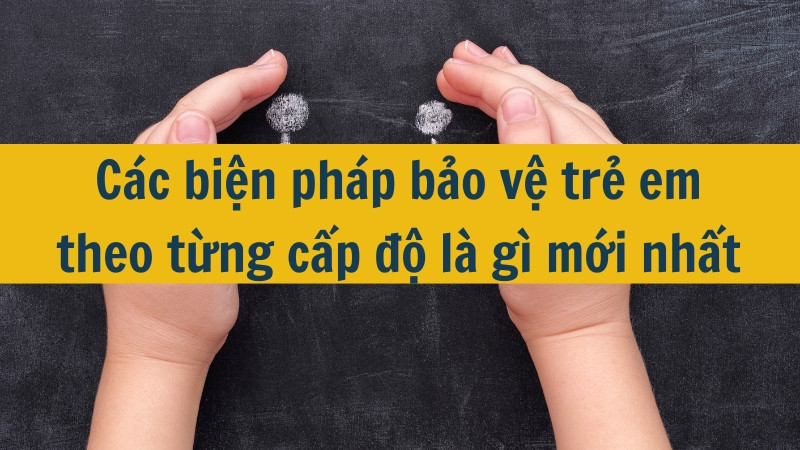
Các biện pháp bảo vệ trẻ em theo từng cấp độ là gì mới nhất 2025?
Với những quy định và chính sách bảo vệ trẻ em liên tục được cập nhật, đặc biệt là vào năm 2025, các biện pháp này đã được chi tiết hóa và phân chia rõ ràng theo từng cấp độ. Trong bài viết này, chúng ta sẽ cùng tìm hiểu về các biện pháp bảo vệ trẻ em theo từng cấp độ, cũng như sự thay đổi và cập nhật mới nhất trong các quy định bảo vệ quyền lợi của trẻ em tại Việt Nam. 25/12/2024Trẻ em là từ bao nhiêu tuổi mới nhất 2025?
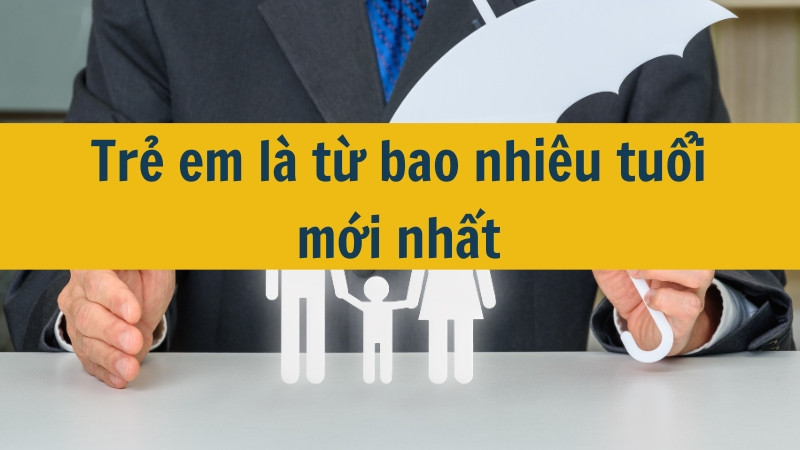
Trẻ em là từ bao nhiêu tuổi mới nhất 2025?
Trẻ em là đối tượng được pháp luật đặc biệt quan tâm và bảo vệ, không chỉ bởi sự non nớt về thể chất, tinh thần mà còn bởi vai trò quan trọng của các em trong sự phát triển bền vững của xã hội. Trong bài viết này, chúng ta sẽ tìm hiểu về quy định mới nhất năm 2025 về độ tuổi được coi là trẻ em tại Việt Nam, cùng với những thay đổi và ý nghĩa pháp lý của nó. 25/12/2024Thế nào là bảo vệ trẻ em? Các cấp độ bảo vệ trẻ em tại Việt Nam mới nhất 2025?
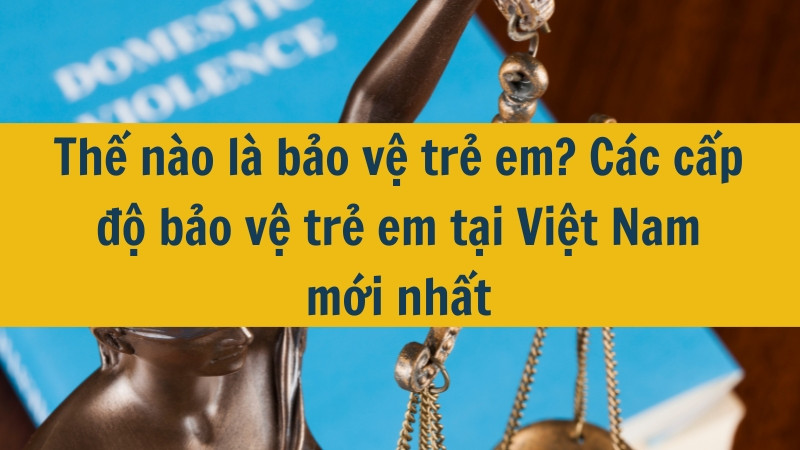
Thế nào là bảo vệ trẻ em? Các cấp độ bảo vệ trẻ em tại Việt Nam mới nhất 2025?
Trẻ em là mầm non của xã hội, xứng đáng được sống, học tập và phát triển trong môi trường an toàn, lành mạnh. Bảo vệ trẻ em không chỉ là trách nhiệm của gia đình, mà còn là nhiệm vụ của cả cộng đồng và các cơ quan quản lý nhà nước. Trong bài viết này, chúng ta sẽ cùng tìm hiểu bảo vệ trẻ em là gì và phân tích chi tiết các cấp độ bảo vệ trẻ em hiện hành tại Việt Nam. 25/12/2024Phát hiện bạo hành trẻ em, báo cho ai để tố cáo mới nhất 2025?
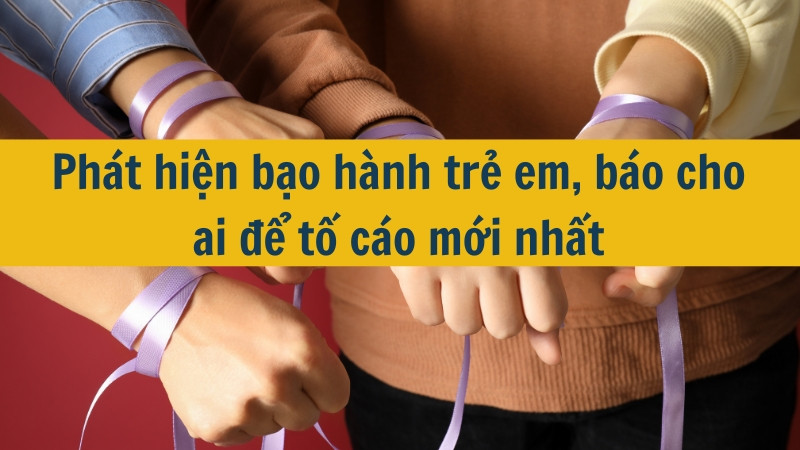
Phát hiện bạo hành trẻ em, báo cho ai để tố cáo mới nhất 2025?
Trong xã hội ngày nay, vấn đề bạo hành trẻ em đang trở thành mối quan tâm nghiêm trọng, đòi hỏi sự can thiệp kịp thời và hiệu quả từ cộng đồng cũng như cơ quan chức năng. Nhưng khi đứng trước một trường hợp cụ thể, bạn có biết cần liên hệ với ai và làm thế nào để tố cáo một cách đúng quy trình, bảo vệ quyền lợi tốt nhất cho trẻ em? Bài viết này sẽ hướng dẫn chi tiết các bước cần thiết, giúp bạn thực hiện trách nhiệm công dân trong việc chung tay bảo vệ thế hệ tương lai. 25/12/2024Bạo hành trẻ em bị phạt thế nào? Có phải đi tù không mới nhất 2025?
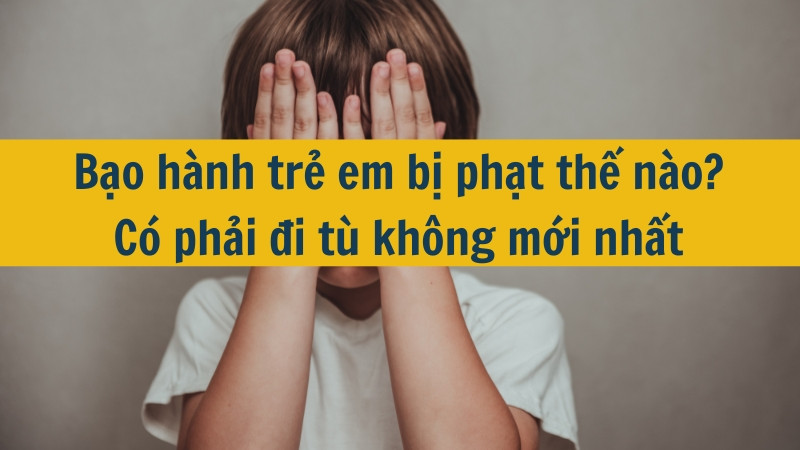
Bạo hành trẻ em bị phạt thế nào? Có phải đi tù không mới nhất 2025?
Bạo hành trẻ em luôn là một vấn đề nghiêm trọng trong xã hội, không chỉ ảnh hưởng đến sự phát triển của trẻ mà còn gây tổn hại lớn đến tương lai của các em. Vấn đề này đã thu hút sự quan tâm đặc biệt của cộng đồng và pháp luật. Theo các quy định mới nhất của pháp luật Việt Nam vào năm 2025, hành vi bạo hành trẻ em sẽ bị xử lý nghiêm minh, với những hình phạt nặng nề đối với người phạm tội. Trong bài viết này, chúng ta sẽ tìm hiểu về các hình thức bạo hành trẻ em, mức độ phạt và những chế tài xử lý đối với hành vi này, đặc biệt là việc bị đi tù và mức án cụ thể trong trường hợp vi phạm. 25/12/2024Thế nào là bạo hành trẻ em? Bạo hành trẻ em đi tù bao nhiêu năm mới nhất 2025?
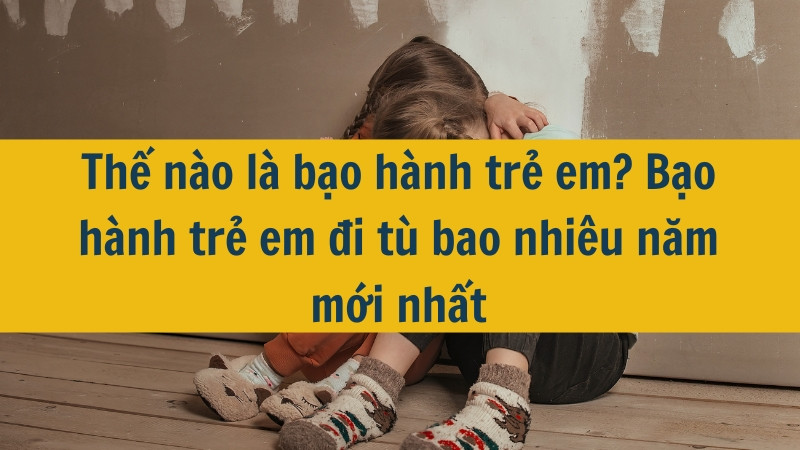
Thế nào là bạo hành trẻ em? Bạo hành trẻ em đi tù bao nhiêu năm mới nhất 2025?
Bạo hành trẻ em là hành vi gây tổn hại về thể chất hoặc tinh thần đối với trẻ, làm ảnh hưởng đến sự phát triển và sức khỏe của trẻ. Đây là một vấn đề nghiêm trọng, không chỉ vi phạm quyền lợi của trẻ mà còn là hành vi vi phạm pháp luật, có thể bị xử lý hình sự. Bài viết này sẽ làm rõ thế nào là bạo hành trẻ em và những hình phạt pháp lý cụ thể cho hành vi này theo quy định mới nhất. 25/12/2024Đăng ký tạm trú online Hà Nội nhanh chóng và hiệu quả mới nhất năm 2025?
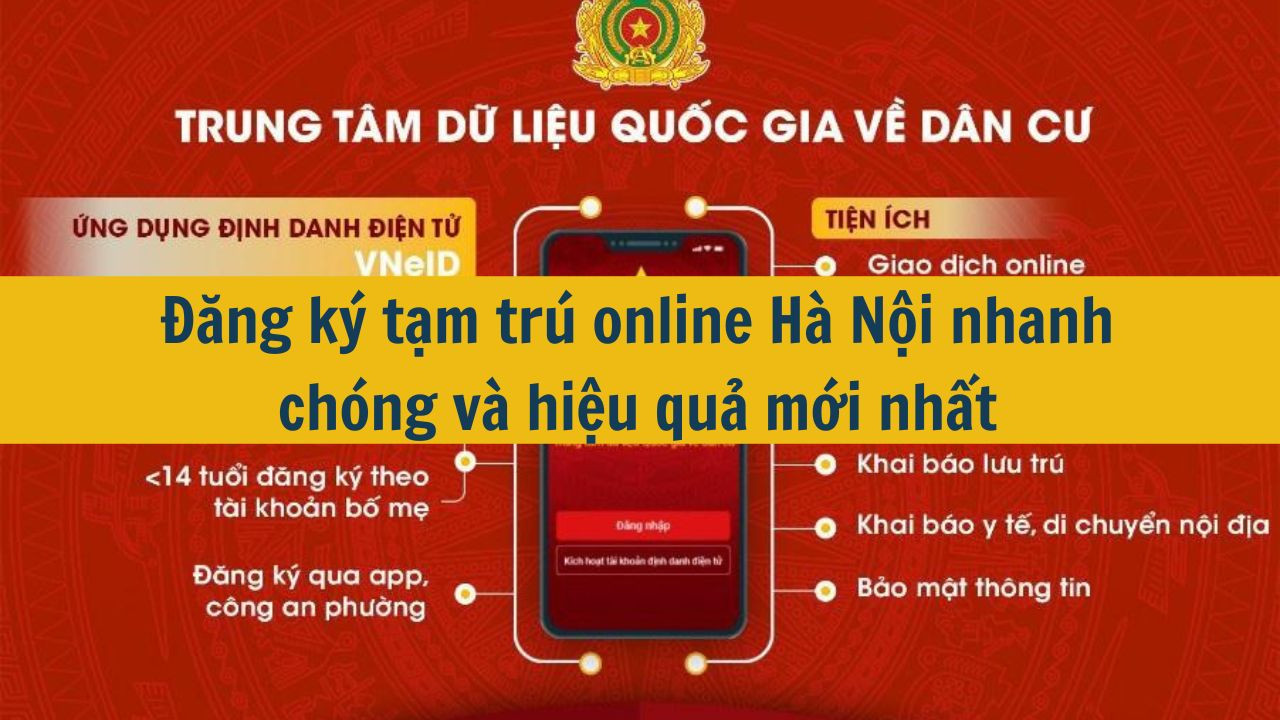
Đăng ký tạm trú online Hà Nội nhanh chóng và hiệu quả mới nhất năm 2025?
Đăng ký tạm trú online là thủ tục đăng ký tạm trú đang được người dân sử dụng ngày càng nhiều và phổ biến. Việc đăng ký tạm trú online giúp tiết kiệm thời gian, chi phí, công sức mà hiệu quả cao. Bài viết sau đây sẽ làm rõ về thủ tục đăng ký tạm trú online Hà Nội nhanh chóng và hiệu quả mới nhất năm 2025. 08/01/2025Đăng ký tạm trú online TP. HCM nhanh chóng và hiệu quả theo quy định mới nhất 2025?
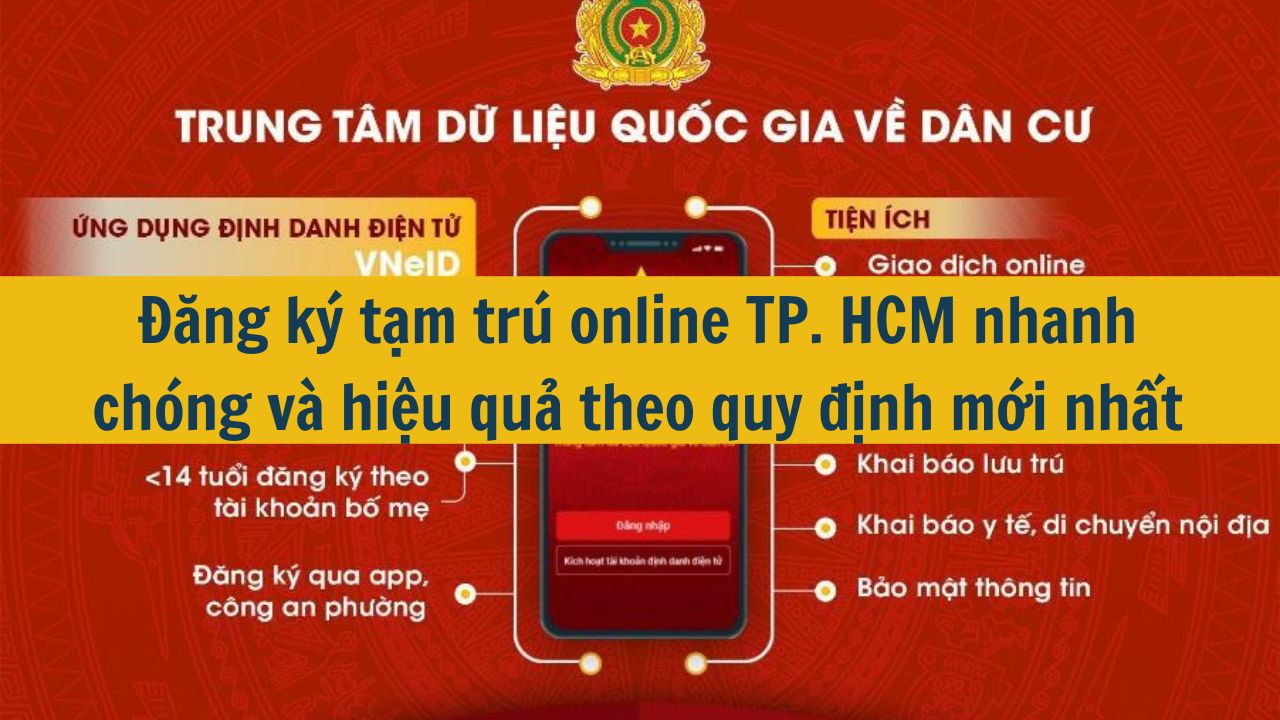
Đăng ký tạm trú online TP. HCM nhanh chóng và hiệu quả theo quy định mới nhất 2025?
Đăng ký hoặc khai báo tạm trú giúp bảo vệ người dân, đảm bảo tình hình an toàn xã hội, thuận tiện cho cơ quan chức năng trong việc quản lý dân cư và dữ liệu công dân. Các cá nhân phải tiến hành khai báo về cư trú đầy đủ và chính xác. Bài viết sau đây sẽ làm rõ về cách thức đăng ký tạm trú online TP. HCM nhanh chóng và hiệu quả theo quy định mới nhất 2025. 07/01/2025Nhập hộ khẩu bao lâu có kết quả mới nhất năm 2025?
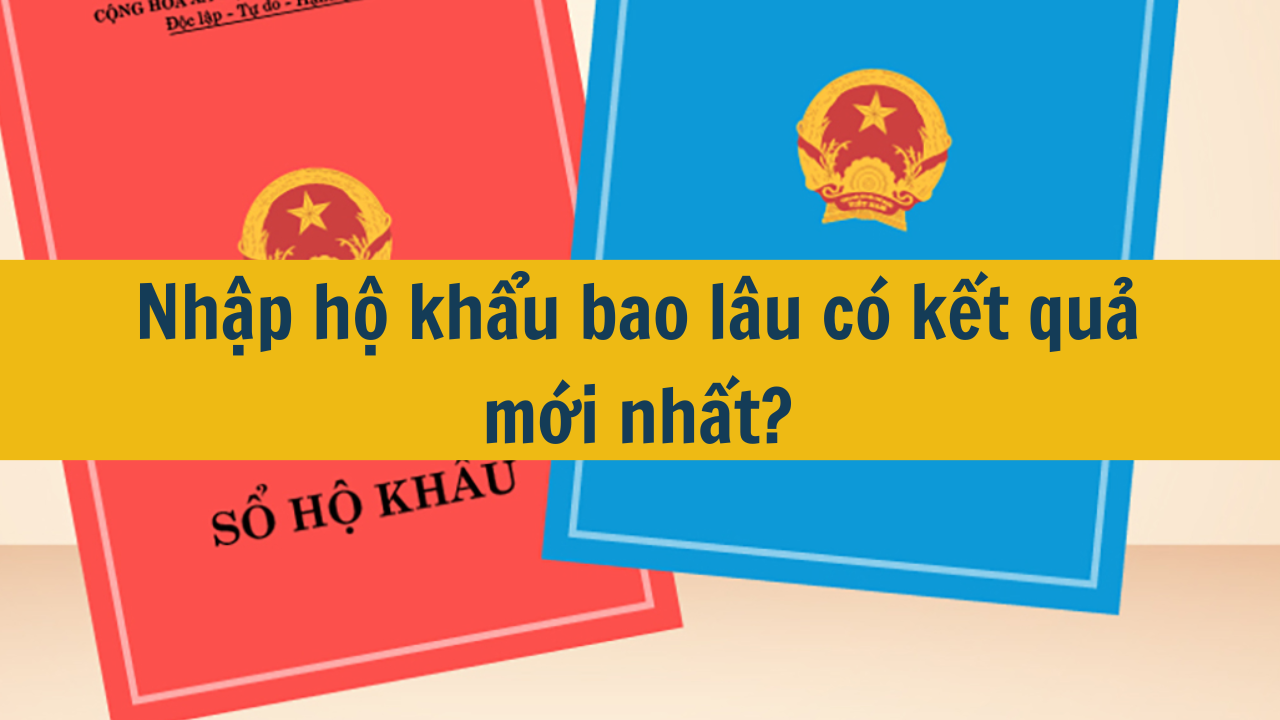
Nhập hộ khẩu bao lâu có kết quả mới nhất năm 2025?
Việc nhập hộ khẩu là một thủ tục hành chính quan trọng và cần thiết đối với công dân Việt Nam, giúp xác định nơi cư trú và quyền lợi của người dân. Tuy nhiên, nhiều người vẫn còn băn khoăn về thời gian xử lý hồ sơ nhập hộ khẩu và các yếu tố ảnh hưởng đến quá trình này. Trong bài viết này, chúng ta sẽ tìm hiểu về quy trình nhập hộ khẩu và thời gian bao lâu có kết quả mới nhất vào năm 2025, giúp bạn có cái nhìn rõ ràng hơn và chuẩn bị tốt hơn khi thực hiện thủ tục này. 27/12/2024Nhập hộ khẩu cần chuẩn bị những giấy tờ gì mới nhất năm 2025?
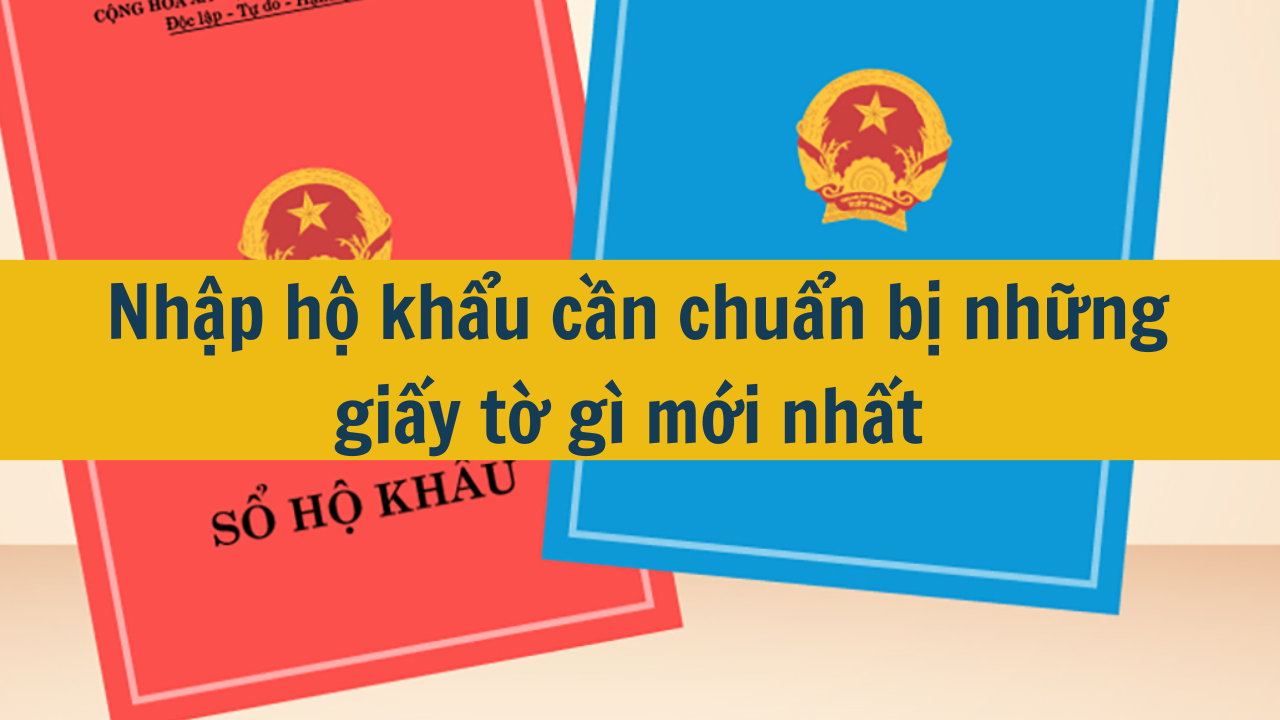

 Luật trẻ em 2016 (Bản Word)
Luật trẻ em 2016 (Bản Word)
 Luật trẻ em 2016 (Bản Pdf)
Luật trẻ em 2016 (Bản Pdf)